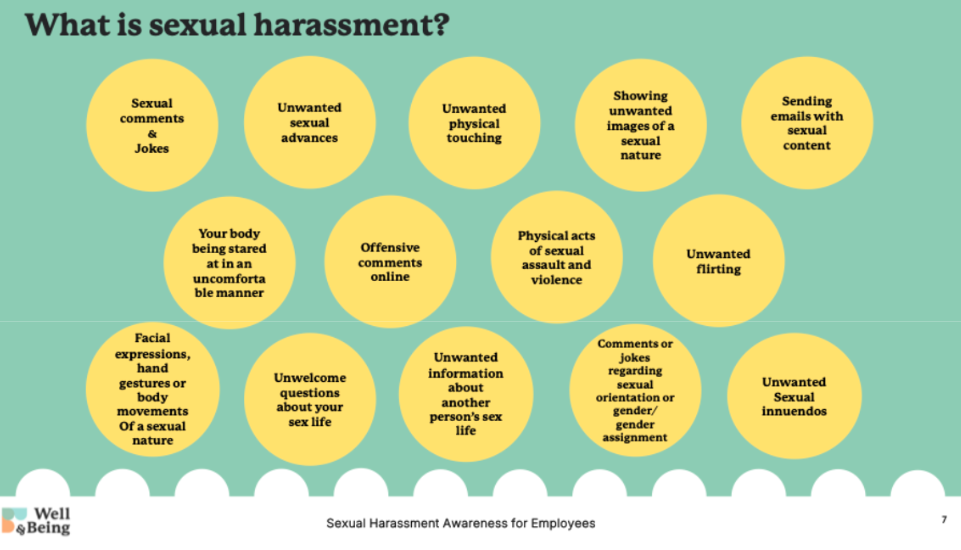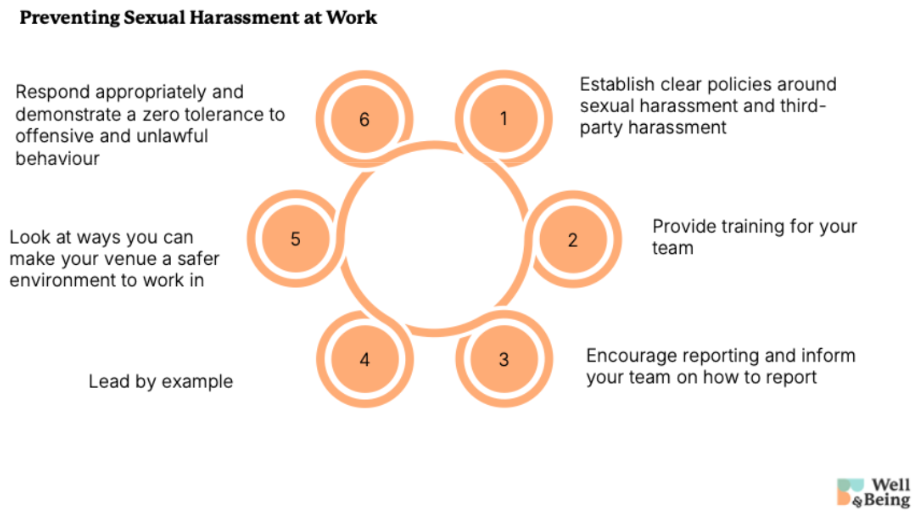THE NEW SEXUAL HARASSMENT LEGISLATION
By Merly Kammerling, founder of Well & Being
It is likely that at some point during our careers in hospitality, we will have seen or will be a victim of some form of sexual harassment from a colleague, a manager, an owner or a customer.
There are many risk factors in hospitality which make employees vulnerable to sexual harassment, such as working face-to-face with the public, company-wide tolerance of sexism and misogyny, privilege and power within the hierarchy, and unclear standards on appropriate and inappropriate behaviour. This leads to hostile environments which lack safety and respect; harassment is passed off as banter, senior staff and owners do not take reports seriously, and there is a lack of encouragement towards staff members to report incidents.
In February last year, McDonald’s was exposed for the knowledge of 400+ workers raising grievances about bullying, discrimination, and sexual harassment over the past five years, and which were not dealt with. McDonald’s CEO admitted to the fact that they received up to 1 or 2 per week, as many as 104 a year. Many victims told the BBC about the normalisation of inappropriate behaviours within the company; having your bum slapped, being groped, being bullied, and having sexual suggestions or comments in stores were all happening daily, and if you raised this you would be threatened with having your hours cut.
Additionally, we regularly see news regarding well-known household names who are flagged for sexual harassment, sometimes ongoing for more than two decades before bosses finally react. Unfortunately, the only people really paying the price are the victims and witnesses of harassment. Many fear being victimised for speaking out, not being believed, losing their jobs or not being able to find work elsewhere. As Employment Lawyer Sarah Russell mentioned in a recent article for the BBC, “Financial vulnerability translates into sexual vulnerability”. Research carried out through the UK Trades Unions Congress (TUC) showed that for every one person who comes forward, five employees do not.
As a business, if you are not acting upon cases of sexual harassment and assault that are brought to you, then you may as well write in your company values, ‘Sexual harassment is okay by us. We care more about all our other values and making money than we do about your human right to live free from abuse and harm.”
However, I am hopeful that all is not doom and gloom. I can attest to the many companies and individuals I have worked with and continue to work with that take a proactive approach and hard stance on harassment. The benefit of this is a safer culture and a stronger team that wants to safeguard and respect one another, leading to better staff morale and performance.
The Law – so what’s changed?
The law on sexual harassment in the UK has recently changed to create a more proactive approach to preventing sexual harassment in the workplace and improve workplace cultures by requiring employers to protect their workers from sexual harassment proactively.
From 26 October 2024, the Worker Protection Act 2023 (Amendment of Equality Act 2010) has strengthened the protection of workers against sexual harassment. The rules mean employers will have a “duty to take reasonable steps” to prevent sexual harassment in the workplace.
- A duty on employers to take reasonable steps to prevent sexual harassment
- A duty to address harassment from third parties
Third-party harassment is a type of sexual harassment that arises when a non-worker, such as a customer, delivery driver or supplier, harasses an employee. A coworker does not fall under third-party harassers. The Trades Union Congress (TUC) survey found that in 39% of the most recent incidents, the perpetrator of the sexual harassment / bullying / verbal abuse was a third party.
What is Sexual Harassment?
Sexual harassment occurs when there are any unwanted behaviours or comments of a sexual nature, if the behaviour or comments violate a person’s dignity or create an intimidating, hostile, degrading or offensive work environment for the individual concerned.
Harassment is judged on how the recipient perceives the unwanted behaviour, not how it was intended. For example, offensive comments passed off as ‘banter’ and intended as a joke or a compliment are not justifiable. If the victim or witness perceives the compliment or joke as sexual harassment, then it is sexual harassment.

Preventing sexual harassment going forward
Implementing preventative measures and protecting employees from third-party harassment will be a real challenge for businesses. Here are some ways you can create some preventative measures towards third-party harassment:
- Put reporting protocols in place so staff know how and who to report incidents to
- Encourage staff to report sexual harassment when it happens
- Discuss as a business what steps will be taken to deal with a complaint and prevent it from happening again
- Assess high-risk workplaces where staff might be left alone with customers
- Train staff so they are aware of the signs and behaviours that could be sexual harassment and how to respond to such behaviour
- Think of ways you can make your guests aware that you operate a zero-tolerance towards offensive and unlawful behaviour

Regardless of new legislation, staff welfare should be paramount in any business. Raising the discussion and upskilling employees on how to deal with sexual harassment as a victim or witness should be a priority for any business. Safeguarding is everyone’s responsibility to ensure a safer environment for all those within our communities.
Merly is the founder of Well & Being. Well & Being runs a hospitality-specific Sexual Harassment in the Workplace Awareness training that can equip you and your team to understand what constitutes sexual harassment, how to confront it, support victims, and provide a safer environment for those in our communities. Visit www.wellandbeing.co.uk.
If you, or someone you know, have been affected by crime, including sexual harassment or any sort of sexual harm, contact Victim Support for free, confidential help. Call 08 08 16 89 111 or go to www.victimsupport.org.uk
Or contact Acas: for employees, employers and anyone affected by sexual harassment at work and in need of guidance in understanding your rights and options in the workplace.
Helpline: 0300 123 1100
www.acas.org.uk/advice
